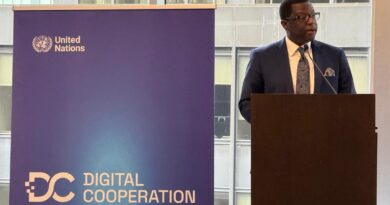Mastercard’s Role in Driving Digital Inclusion in Zambia Spotlighted at 2023 Africa Fintech Summit
During the 10th annual Africa Fintech Summit in Lusaka, Zambia, Vincent Chipimo Malekani, the Country Business Development Director for Mastercard Zambia, shared insights into the impact of COVID-19 on Zambia’s digital payments landscape, Mastercard’s efforts in advancing digital payments, and its commitment to fostering digital inclusion in the country.
Like many nations globally, Zambia felt the adverse effects of the COVID-19 pandemic, particularly in its digital sphere. The pandemic underscored the necessity of connectivity for individuals and small businesses to thrive in the digital economy.
Despite some progress in certain economies, Mr. Malekeni mentioned that many Africans, including Zambians, continue to grapple with financial exclusion and vulnerability. Approximately 30 million people in Africa fell into extreme poverty in 2021, with 22 million jobs lost due to the pandemic, a trend that persists in 2023.
Nevertheless, he stated that this situation presents an opportunity for Zambia to invest in digital solutions to enhance efficiency. Post-pandemic, cross-border payments have become a focal point, presenting a promising avenue for Mastercard’s business.
Mr. Malekani cited the Mastercard New Payments Index 2022, which highlighted the rising trend of emerging digital payment methods in South Africa. In Zambia, a significant 91.4% of the population boasts mobile connections, indicating progress in digital connectivity.
To achieve financial and digital inclusion for all Zambians, Mr. Malekani said that Mastercard has partnered with public and private sectors, as well as non-governmental organizations, to develop and scale relevant digital solutions.
The company aims to establish a Pan-African digital infrastructure and include 20,752 million Zambians in the financial and digital economy, regardless of their location, whether in urban or rural areas, he disclosed.
He emphasized Mastercard’s dedication to advancing payment solutions in Zambia to promote financial inclusion. Despite many Zambians still favoring cash, the organization seeks to transition to a digital economy by offering futuristic solutions. Mobile banking plays a crucial role in this transition, enabling the integration of e-commerce, micro-loans, bill payments, and remittances.
The Buy Now Pay Later (BNPL) trend has gained prominence in recent years and is expected to account for a significant share of global e-commerce transactions by 2026. Mobile payments are on the rise in Zambia, driven by innovative solutions such as Scan to Pay, Samsung Pay, and Tap On Phone.
As a global digital payments organization with a presence in over 210 countries and territories, Mr. Malekani stated that Mastercard is committed to bringing one billion people into the digital economy by 2050, including 50 million micro and small businesses, with a particular focus on 25 million women entrepreneurs.
The company’s strategy revolves around promoting inclusive growth in Zambia and across Africa, working with private companies, government institutions, and development agencies to develop and scale relevant solutions.
Mr. Malekani said that Mastercard acknowledges that digital connectivity is a prerequisite for financial inclusion and is committed to partnering with local fintechs, telecommunications companies, financial institutions, government entities, and non-traditional organizations to achieve these goals.
As of early 2022, 91.4% of the Zambian population had mobile connections, including rural areas, where mobile phone ownership stood at 72.4%. This widespread connectivity offers Mastercard an opportunity to tap into rural Zambia and enhance productivity and economic growth.
He said Mastercard recognizes Africa as a significant market for fintech and digital solutions, and the company is the partner of choice for 70% of fintech organizations within its network.
The company collaborates with local fintech organizations to provide underserved communities with access to digital and financial solutions. Innovative solutions such as Lupiya, a neobank, and SPENN, a mobile wallet, are making strides in Zambia.
He said these partnerships aim to provide consumers and small businesses with a seamless, safe, and affordable digital payments experience.
According to Mr. Malekani, Mastercard’s collaboration with local fintech Digital PayGo led to the creation of SME-in-a-Box, a mobile payment solution that enables small businesses to make and receive digital payments.
He further said that the company also partners with mobile network operators like Zamtel and MTN to enable customers to use mobile money for online and in-person payments, including cross-border payments.
In conclusion, Mr. Malekani emphasized Mastercard’s commitment to advancing digital inclusion in Zambia, demonstrating the organization’s dedication to promoting financial and digital inclusion, supporting SMEs, and forging partnerships to transform Zambia’s digital payments landscape. Mastercard’s extensive expertise and global reach position it as a vital player in driving inclusive growth and innovation in the region.



